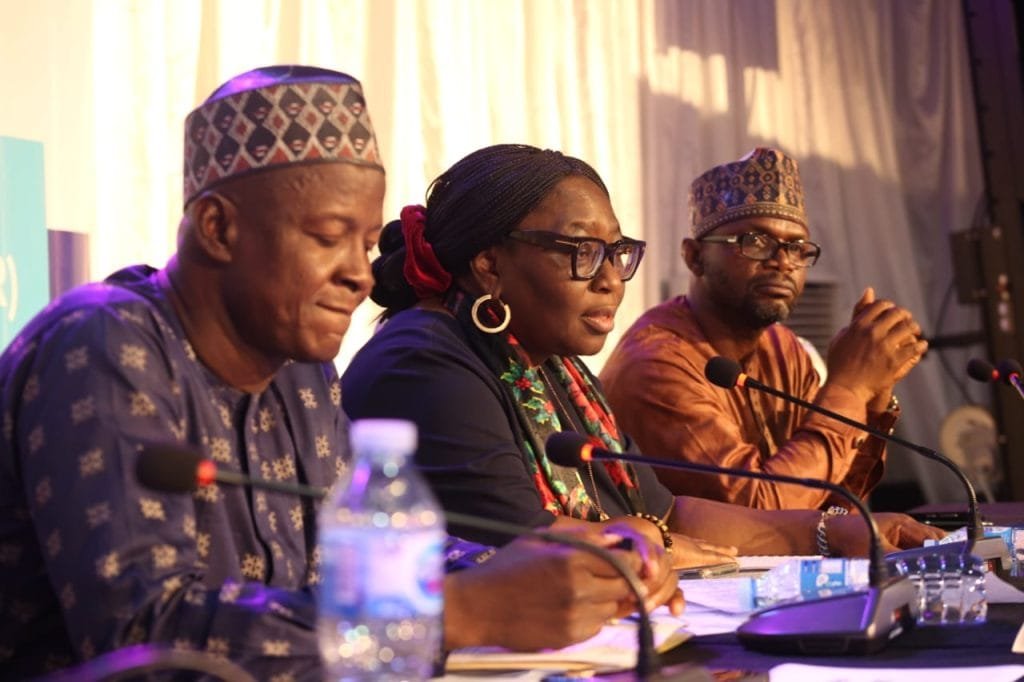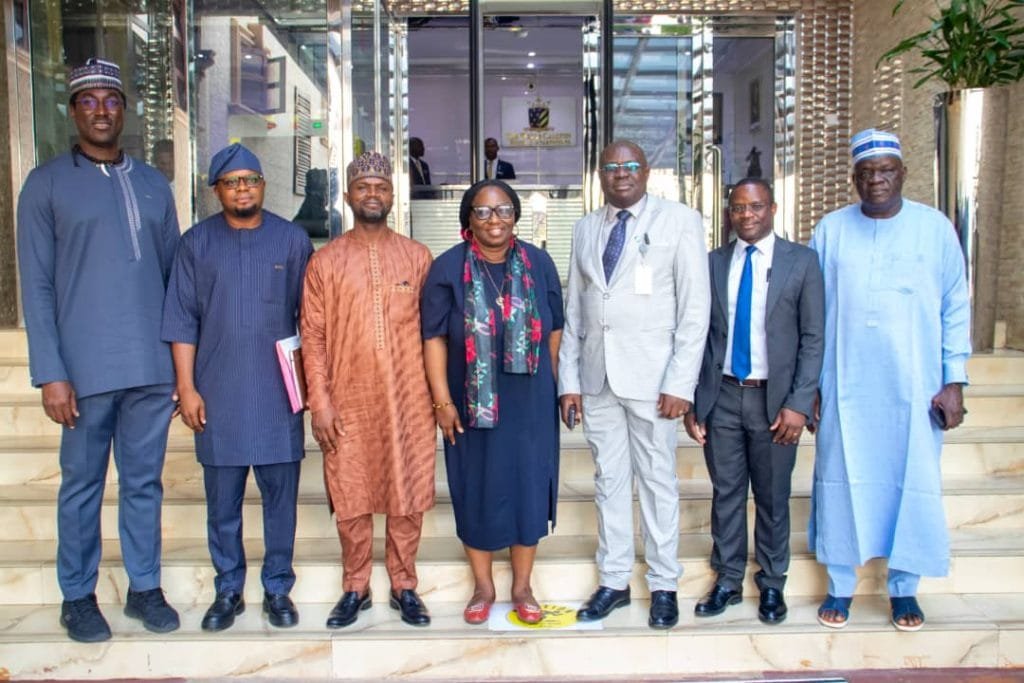The Federal Government in collaboration with the International Fund for Agricultural Development (IFAD) has launched a policy dialogue initiative to kick start the process of harmonising the digital farmers registry in line with the cooperation agreement and strategy between the Federal Government of Nigeria and IFAD.
Specifically, the cooperation strategy puts an emphasis on the digitalisation of agriculture as a lever to transform the food system in Nigeria.
Speaking at the official launch of the Policy Dialogue Initiative on the National Digital Farm Registry, the Permanent Secretary, Federal Ministry Of Agriculture And Food Security, Dr. Marcus O. Ogunbiyi said despite Nigeria’s agricultural potential to drive food security, industrial development, and export revenue, yet, for far too long, efforts to transform the sector have been hampered by a lack of reliable data, especially on the key actors, especially the farmers.

To address this gap, the PS added, the Digital National Farmers’ Registry has been designed as a transformative initiative that seeks to capture accurate, real-time, and geo-referenced data on farmers across the country — disaggregated by location, commodity, scale of production, gender, and age.
He said, “This registry is not just a database, it is more than a database; it is a strategic tool for promoting inclusion, transparency, and measurable impact. It is the foundation for evidence-based planning, targeted intervention, inclusive policymaking, and accountability in the agricultural ecosystem.
“It allows us to identify and reach real farmers with the right support, eliminate inefficiencies, and ensure that resources are aligned with national priorities. A reliable and up-to-date Farmers’ Registry is therefore fundamental to effective planning, precise targeting, and efficient delivery of agricultural interventions.
“With a credible farmers’ registry, we can ensure that inputs reach the intended beneficiaries; that support programmes are tailored to the actual needs of our farmers, and that government interventions yield the desired impact. Moreover, it will empower financial institutions, agribusinesses, insurers, and other stakeholders to engage with our farmers with clarity, confidence, and precision.”
The PS noted that the Federal Ministry of Agriculture and Food Security has taken decisive steps to transform its approach to farmer data management.
“Chief among these is our strategic partnership with the National Identity Management Commission (NIMC) to implement a far-reaching Farmer Registration and Database Project. At the heart of this initiative is the integration of the National Identification Number (NIN), which ensures that every Nigerian farmer is uniquely identified and seamlessly integrated into a national agricultural system.
“Moreover, the registration process involves geo-tagging farmers to their farmlands, a feature that enhances traceability, planning, and monitoring. This bold move marks a major milestone in our efforts to improve transparency, eliminate ghost beneficiaries, and deliver effective government-to-people (G2P) services.
“In practical terms, we are digitising and harmonising farmer data across all 36 states and the Federal Capital Territory. By linking farmers to a government-to-people (G2P) Card, we enable direct access to inputs, interventions, extension services, and financial inclusion. Importantly, we see digital identity not just as a technological solution, but as a catalyst for empowerment—one that opens doors to credit, insurance, climate-smart technologies, and market opportunities.
“As part of the digital farmer friendly programme of the Ministry, the National Electronic Extension Platform (NEEP) has just been developed and launched in March 2025. It is a digital initiative aimed at improving agricultural service delivery, boosting productivity, and strengthening connections between research institutions and farmers. This platform will also be interoperable with the Farmer Registry platform and make access to quality extension services very easy and seamless for all stakeholders in the agricultural sector.
“To complement this effort, the Ministry is also developing the National Agricultural Data Management and Information System (NADM IS). This centralised platform is designed to harmonise and integrate agricultural data across all departments, programmes, and projects. Once operational, NADMIS will serve as a unified, interoperable system to improve planning, coordination, and responsiveness across the agricultural sector.
“Indeed, this database is not merely a list of names and numbers. It is a dynamic instrument for inclusive agricultural governance. It will enable us to design and implement targeted interventions for smallholders, women, youth, and other vulnerable groups, ensuring that no one is left behind in our pursuit of sustainable development.
“Therefore, today’s policy dialogue is both timely and strategic. It provides us with a valuable opportunity to reflect on our progress, identify policy and operational gaps, and build consensus around the institutional frameworks required to sustain and scale these initiatives. Our collective efforts here will directly contribute to achieving the Renewed Hope Agenda of His Excellency, President Bola Ahmed Tinubu, GCFR.
“Achieving this ambitious vision requires more than just good intentions or even government effort alone — it demands robust, strategic, and sustained collaboration with all relevant stakeholders,” he explained extensively.
Ogunbiyi acknowledged IFAD and other development partners for their continued support in strengthening agricultural systems in Nigeria.
“IFAD’s longstanding commitment to smallholder farmers, its technical expertise, and its strategic investments in rural development have been instrumental in bridging capacity gaps, enhancing digital inclusion, and strengthening the resilience of our food systems.
“The implementation and sustainability of the Digital Farmers’ Registry will benefit immensely from such partnerships — not only in terms of funding, but also in technical design, knowledge transfer, institutional capacity-building, and inclusive governance mechanisms. Our collaboration with IFAD and similar institutions ensures that the registry is not just a database, but a living tool aligned with global best practices and tailored to local realities.”
The PS further underscored the need to deepen collaboration with local governments, farmer cooperatives, financial institutions, telecom providers, and civil society actors to ensure last-mile data collection and the full integration of rural farmers into the national agricultural landscape.
“This is a defining moment for the future of agriculture in Nigeria. With strong collaboration, credible data, and a shared vision, we can build an agricultural system that is efficient, equitable, and transformative,” he assured.
On her part, the Country Director, IFAD, Mrs Dede Ekoue, recalled that the journey on facilitating the digitalisation of agriculture started a long time ago, with IFAD, the Federal Minister of Agriculture, NiTDA, the Office of the Vice President and other key stakeholders.
“We started two years ago with a policy dialogue on ICT4D. We have also launched several technical capacity building, some of which have already been leveraged by the Federal Ministry of Agriculture and Food Security as they enhance their database.

“We have also facilitated an exchange visit on digitalisation of agriculture to Kenya, and one key output that we can leverage is the ecosystem assessments of digitalisation of agriculture in Nigeria that we have completed,” she added.
Ekoue, giving an insight into what informed the official launch, explained that the policy dialogue, the second policy dialogue (sic), resulted in a recommendation to have an harmonised digital farmer registry by critical stakeholders.
Her words; “This is why today, under the leadership of the Federal Ministry of Agriculture and Food Security, in collaboration with Heifer International, we are together with all of you launching the policy dialogue initiative on the National Digital Farmer Registry.
“If there was one word to summarise the importance of this policy dialogue initiative, that word would be partnership. So we look forward to partnering with you in supporting the government’s effort to put in place a strong national farmer registry.”
The Country Director also commended the government for taking steps to put in place a NIN-enabled farmer registry, “this is highly commendable,” she emphasised.
In his remark, the Country Director, Heifer International in Nigeria, Dr. Lekan Tobe, emphasized the critical role of partnership and data in transforming Nigeria’s agricultural sector.
Dr. Tobe commended the federal government’s proactive steps in recognizing the importance of a national digital farmer registry, highlighting that the initiative, born from recommendations of previous policy dialogues organized in collaboration with the federal government, aims to scale up innovative digital technology to enhance food systems across the country.
According to him, a robust national digital farmer registry will support appropriate decision-making and human-centered policies, facilitate equitable distribution of agricultural solutions, improve coordination among food system actors, and enhance innovation such as precision agriculture, mechanization, and access to finance.
Dr. Tobe emphasized that the initiative aligns with the National Agricultural Technology and Innovation Policy (NATIP), aiming to foster a conducive policy and investment environment for the registry, outlining three key objectives for the policy dialogue initiative to including; strengthening stakeholder capacity, developing strategic recommendations for partnership, and facilitating the launch of a multi-stakeholder platform.
Dr. Tobe, however, pointed out that while progress has been made, challenges like fragmented databases, inadequate digital infrastructure in rural areas, and low digital literacy persist.

Furthermore, the Country Director, Heifer, presented a clear roadmap for the initiative, which he noted included; identifying global best practices, engaging relevant stakeholders, building capacity, and conducting high-level roundtable engagements.
“Key deliverables include reports on best practices and assessments of existing registries, strategic recommendations, and the launch of the multi-stakeholder platform.
Tobe also described the registry’s significance as “a critical step towards enabling targeted, efficient, and transparent service delivery to farmers by consolidating farmer data, improving traceability, and enhancing access to digital services.”
“The success of this initiative is dependent on the commitment, input, and guidance of all stakeholders in support of the Federal Ministry of Agriculture and Food Security, who are leading the process,” he concluded.
Meanwhile, the event, which marks the official launch of the vital initiative, sets the stage for collaborative efforts to build a sustainable and efficient digital farmer registry in Nigeria, ultimately contributing to food security and the transformation of the nation’s food system.
Heifer International is an implementing partner to achieve the national digital farmer registry.

